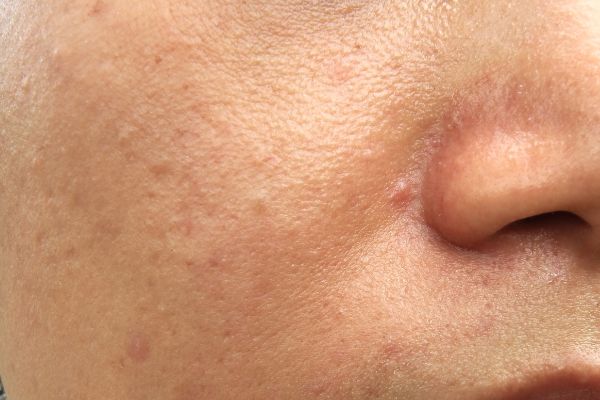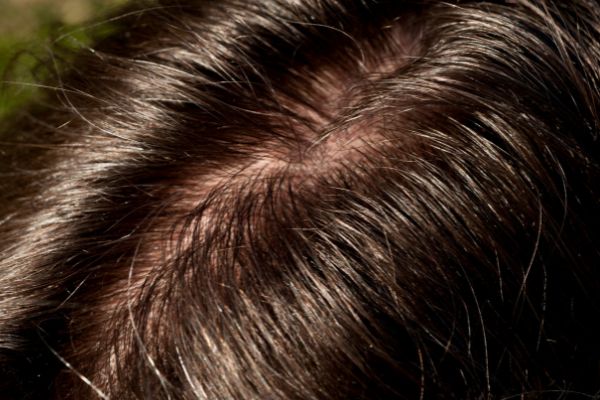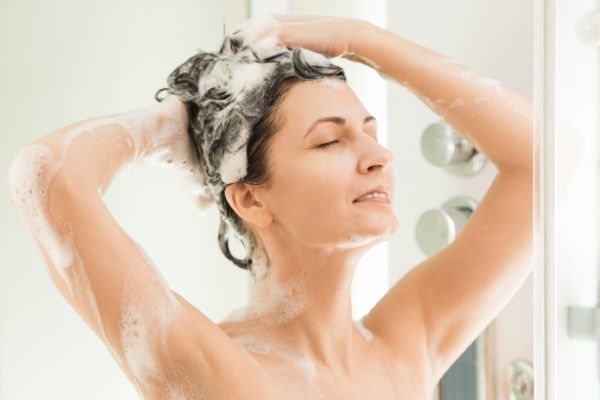Oily hair looks messy, greasy, oily, shiny and often has an unpleasant odor.
People who have oily hair often also have other areas of the skin such as the nose, forehead or chin oily, ie "seborrheic". The term seborrheic comes from the word sebum. Sebum is a natural oil produced by the sebaceous glands that coats and protects the scalp from bacteria. However, excessive sebum production leads to oily hair.

We can identify two types of sebum: fatty sebum and oily sebum. Oily sebum is dense and sits on the skin, making it oily. Oily sebum is more liquid and spreads easily over the hair, making it greasy and oily.
An oily scalp often has boils. Boils are small abscesses that can form in the skin and are often accompanied by inflammation and pain. Boils usually appear where hair follicles have been blocked by sebum or bacteria.
The presence of oily dandruff, white or semi-yellow scales composed of dead skin, on the scalp is common for people suffering from oily hair. They may also suffer from itching and localized pain on the scalp.
In these cases, the sebum leads to clogging of the follicles, thus preventing healthy hair growth.
Generally, sebum has the function of facilitating skin hydration, lubricating and waterproofing the hair shaft, making it more robust, resistant and aesthetically pleasing, and establishing a layer that protects the skin from external agents such as the sun, the cold and bacteria. Androgen hormones are also very important, as they control the amount of sebum produced by the sebaceous gland.
During hypersecretion of sebum (seborrhea), the functions of sebum are altered and the balance is broken. This imbalance jeopardizes hair health and consequently causes hair and scalp problems.
Symptoms such as itching and irritation of the scalp are caused by the presence of excess sebum, which can lead to seborrheic hair loss. However, it is not dangerous for health and remains an aesthetic or hygienic problem.
Excessive production of sebum and defects in its quality can eventually damage and damage hair and lead to hair loss.

Some of the causes of oily hair include: stress, hormonal imbalances, digestive disorders, auto-intoxication and nutrition.
Profuse sweating of the scalp is called hyperhidrosis. In this case, the sweat expelled by the sweat glands mixes with the sebum, making it more greasy and oily. Usually, hyperhidrosis is not associated with an oily face and skin.

The use of bad shampoos or other hair products that are too harsh can be included among the potential causes of oily hair, since their use leads to excessive production of sebum, which aggravates the problem.
It is important to use a delicate shampoo containing cysteine derivatives or B vitamins which prevents the removal of too much sebum from the skin, thus depriving it of its natural protection . Freÿa shampoo is the ideal shampoo for oily hair. It allows deep cleansing without stripping or disturbing the natural balance of your scalp. You can then increase the frequency of washing the hair to let the skin release excess oil, allowing the hair to "breathe".
In addition, the use of a hair treatment helps reduce excessive sebum production. It is important to use a mask with antibacterial and antiseptic properties to purify and eliminate waste and bacteria.
Opt for a light mask containing jojoba oil such as the Angëlia hair mask , which helps regulate the overproduction of sebum on the scalp while stimulating hair growth.
Do not dry the hair at high temperatures or by holding the dryer too close to the skin, as this causes the sebum to thin, thus increasing its production.
A final, natural remedy is the use of saw palmetto to combat the action of dihydrotestosterone (DHT), responsible not only for excess sebum, but also for hair loss. It is important to talk to your doctor before taking any dietary supplement.
There are state-of-the-art hair treatments that work deep in the skin, influencing follicle activity, such as PRP.
A good massage with a stimulating serum such as L'Ör fortifying serum improves the circulation of the skin blocked by the pressure that excess sebum imposes on the hair follicles.
In conclusion, remember that oily hair is not just an aesthetic challenge, but a symptom of a skin abnormality that can damage hair, increasing hair loss.




